- Home
- Cormac McCarthy
Blood Meridian, or the Evening Redness in the West Page 3
Blood Meridian, or the Evening Redness in the West Read online
Page 3
It was dark when he entered the town, attended by barking dogs, faces parting the curtains in the lamplit windows. The light clatter of the mule's hooves echoing in the little empty streets. The mule sniffed the air and swung down an alleyway into a square where there stood in the starlight a well, a trough, a hitchingrail. The kid eased himself down and took the bucket from the stone coping and lowered it into the well. A light splash echoed. He drew the bucket, water dripping in the dark. He dipped the gourd and drank and the mule nuzzled his elbow. When he'd done he set the bucket in the street and sat on the coping of the well and watched the mule drink from the bucket.
He went on through the town leading the animal. There was no one about. By and by he entered a plaza and he could hear guitars and a horn. At the far end of the square there were lights from a cafe and laughter and highpitched cries. He led the mule into the square and up the far side past a long portico toward the lights.
There was a team of dancers in the street and they wore gaudy costumes and called out in Spanish. He and the mule stood at the edge of the lights and watched. Old men sat along the tavern wall and children played in the dust. They wore strange costumes all, the men in dark flatcrowned hats, white nightshirts, trousers that buttoned up the outside leg and the girls with garish painted faces and tortoiseshell combs in their blueblack hair. The kid crossed the street with the mule and tied it and entered the cafe. A number of men were standing at the bar and they quit talking when he entered. He crossed the polished clay floor past a sleeping dog that opened one eye and looked at him and he stood at the bar and placed both hands on the tiles. The barman nodded to him. Digame, he said.
I aint got no money but I need a drink. I'll fetch out the slops or mop the floor or whatever.
The barman looked across the room to where two men were playing dominoes at a table. Abuelito, he said.
The older of the two raised his head.
Que dice el muchacho.
The old man looked at the kid and turned back to his dominoes.
The barman shrugged his shoulders.
The kid turned to the old man. You speak american? he said.
The old man looked up from his play. He regarded the kid without expression.
Tell him I'll work for a drink. I aint got no money.
The old man thrust his chin and made a clucking noise with his tongue.
The kid looked at the barman.
The old man made a fist with the thumb pointing up and the little finger down and tilted his head back and tipped a phantom drink down his throat. Quiere hecharse una copa, he said. Pero no puede pagar.
The men at the bar watched.
The barman looked at the kid.
Quiere trabajo, said the old man. Quien sabe. He turned back to his pieces and made his play without further consultation.
Quieres trabajar, said one of the men at the bar.
They began to laugh.
What are you laughing at? said the boy.
They stopped. Some looked at him, some pursed their mouths or shrugged. The boy turned to the bartender. You got something I could do for a couple of drinks I know damn good and well.
One of the men at the bar said something in Spanish. The boy glared at them. They winked one to the other, they took up their glasses.
He turned to the barman again. His eyes were dark and narrow. Sweep the floor, he said.
The barman blinked.
The kid stepped back and made sweeping motions, a pantomime that bent the drinkers in silent mirth. Sweep, he said, pointing at the floor.
No esta sucio, said the barman.
He swept again. Sweep, goddamnit, he said.
The barman shrugged. He went to the end of the bar and got a broom and brought it back. The boy took it and went on to the back of the room.
A great hall of a place. He swept in the corners where potted trees stood silent in the dark. He swept around the spittoons and he swept around the players at the table and he swept around the dog. He swept along the front of the bar and when he reached the place where the drinkers stood he straightened up and leaned on the broom and looked at them. They conferred silently among themselves and at last one took his glass from the bar and stepped away. The others followed. The kid swept past them to the door.
The dancers had gone, the music. Across the street sat a man on a bench dimly lit in the doorlight from the cafe. The mule stood where he'd tied it. He tapped the broom on the steps and came back in and took the broom to the corner where the barman had gotten it. Then he came to the bar and stood.
The barman ignored him.
The kid rapped with his knuckles.
The barman turned and put one hand on his hip and pursed his lips.
How about that drink now, said the kid.
The barman stood.
The kid made the drinking motions that the old man had made and the barman flapped his towel idly at him.
Andale, he said. He made a shooing motion with the back of his hand.
The kid's face clouded. You son of a bitch, he said. He started down the bar. The barman's expression did not change. He brought up from under the bar an oldfashioned military pistol with a flint lock and shoved back the cock with the heel of his hand. A great wooden clicking in the silence. A clicking of glasses all down the bar. Then the scuffling of chairs pushed back by the players at the wall.
The kid froze. Old man, he said.
The old man didnt answer. There was no sound in the cafe. The kid turned to find him with his eyes.
Esta borracho, said the old man.
The boy watched the barman's eyes.
The barman waved the pistol toward the door.
The old man spoke to the room in Spanish. Then he spoke to the barman. Then he put on his hat and went out.
The barman's face drained. When he came around the end of the bar he had laid down the pistol and he was carrying a bung-starter in one hand.
The kid backed to the center of the room and the barman labored over the floor toward him like a man on his way to some chore. He swung twice at the kid and the kid stepped twice to the right. Then he stepped backward. The barman froze. The kid boosted himself lightly over the bar and picked up the pistol. No one moved. He raked the frizzen open against the bartop and dumped the priming out and laid the pistol down again. Then he selected a pair of full bottles from the shelves behind him and came around the end of the bar with one in each hand.
The barman stood in the center of the room. He was breathing heavily and he turned, following the kid's movements. When the kid approached him he raised the bung-starter. The kid crouched lightly with the bottles and feinted and then broke the right one over the man's head. Blood and liquor sprayed and the man's knees buckled and his eyes rolled. The kid had already let go the bottleneck and he pitched the second bottle into his right hand in a roadagent's pass before it even reached the floor and he backhanded the second bottle across the barman's skull and crammed the jagged remnant into his eye as he went down.
The kid looked around the room. Some of those men wore pistols in their belts but none moved. The kid vaulted the bar and took another bottle and tucked it under his arm and walked out the door. The dog was gone. The man on the bench was gone too. He untied the mule and led it across the square.
He woke in the nave of a ruinous church, blinking up at the vaulted ceiling and the tall swagged walls with their faded frescos. The floor of the church was deep in dried guano and the droppings of cattle and sheep. Pigeons flapped through the piers of dusty light and three buzzards hobbled about on the picked bone carcass of some animal dead in the chancel.
His head was in torment and his tongue swollen with thirst. He sat up and looked around him. He'd put the bottle under his saddle and he found it and held it up and shook it and drew the cork and drank. He sat with his eyes closed, the sweat beaded on his forehead. Then he opened his eyes and drank again. The buzzards stepped down one by one and trotted off into the sacristy. After a while he rose and
went out to look for the mule.
It was nowhere in sight. The mission occupied eight or ten ares of enclosed land, a barren purlieu that held a few goats and burros. In the mud walls of the enclosure were cribs inhabited by families of squatters and a few cookfires smoked thinly in the sun. He walked around the side of the church and entered the sacristy. Buzzards shuffled off through the chaff and plaster like enormous yardfowl. The domed vaults overhead were clotted with a dark furred mass that shifted and breathed and chittered. In the room was a wooden table with a few clay pots and along the back wall lay the remains of several bodies, one a child. He went on through the sacristy into the church again and got his saddle. He drank the rest of the bottle and he put the saddle on his shoulder and went out.
The facade of the building bore an array of saints in their niches and they had been shot up by American troops trying their rifles, the figures shorn of ears and noses and darkly mottled with leadmarks oxidized upon the stone. The huge carved and paneled doors hung awap on their hinges and a carved stone Virgin held in her arms a headless child. He stood blinking in the noon heat. Then he saw the mule's tracks. They were just the palest disturbance of the dust and they came out of the door of the church and crossed the lot to the gate in the east wall. He hiked the saddle higher onto his shoulder and set out after them.
A dog in the shade of the portal rose and lurched sullenly out into the sun until he had passed and then lurched back. He took the road down the hill toward the river, a ragged figure enough. He entered a deep wood of pecan and oak and the road took a rise and he could see the river below him. Blacks were washing a carriage in the ford and he went down the hill and stood at the edge of the water and after a while he called out to them.
They were sopping water over the black lacquerwork and one of them raised up and turned to look at him. The horses stood to their knees in the current.
What? called the black.
Have you seen a mule.
Mule?
I lost a mule. I think he come this way.
The black wiped his face with the back of his arm. Somethin come down the road about a hour back. I think it went down the river yonder. It might of been a mule. It didnt have no tail nor no hair to speak of but it did have long ears.
The other two blacks grinned. The kid looked off down the river. He spat and set off along the path through the willows and swales of grass.
He found it about a hundred yards downriver. It was wet to its belly and it looked up at him and then lowered its head again into the lush river grass. He threw down the saddle and took up the trailing rope and tied the animal to a limb and kicked it halfheartedly. It shifted slightly to the side and continued to graze. He reached atop his head but he had lost the crazy hat somewhere. He made his way down through the trees and stood looking at the cold swirling waters. Then he waded out into the river like some wholly wretched baptismal candidate.
III
Sought out to join an army - Interview with Captain White - His views - The camp - Trades his mule - A cantina in the Laredito - A Mennonite -- Companion killed.
He was lying naked under the trees with his rags spread across the limbs above him when another rider going down the river reined up and stopped.
He turned his head. Through the willows he could see the legs of the horse. He rolled over on his stomach.
The man got down and stood beside the horse.
He reached and got his twinehandled knife.
Howdy there, said the rider.
He didnt answer. He moved to the side to see better through the branches.
Howdy there. Where ye at?
What do you want?
Wanted to talk to ye.
What about?
Hell fire, come on out. I'm white and christian.
The kid was reaching up through the willows trying to get his breeches. The belt was hanging down and he tugged at it but the breeches were hung on a limb.
Goddamn, said the man. You aint up in the tree are ye?
Why dont you go on and leave me the hell alone.
Just wanted to talk to ye. Didnt intend to get ye all riled up.
You done got me riled.
Was you the feller knocked in that Mexer's head yesterday evenin? I aint the law.
Who wants to know?
Captain White. He wants to sign that feller up to join the army.
The army?
Yessir.
What army?
Company under Captain White. We goin to whip up on the Mexicans.
The war's over.
He says it aint over. Where are you at?
He rose and hauled the breeches down from where he'd hung them and pulled them on. He pulled on his boots and put the knife in the right bootleg and came out from the willows pulling on his shirt.
The man was sitting in the grass with his legs crossed. He was dressed in buckskin and he wore a plug hat of dusty black silk and he had a small Mexican cigar in the corner of his teeth. When he saw what clawed its way out through the willows he shook his head.
Kindly fell on hard times aint ye son? he said.
I just aint fell on no good ones.
You ready to go to Mexico?
I aint lost nothin down there.
It's a chance for ye to raise ye self in the world. You best make a move someway or another fore ye go plumb in under.
What do they give ye?
Ever man gets a horse and his ammunition. I reckon we might find some clothes in your case.
I aint got no rifle.
We'll find ye one.
What about wages?
Hell fire son, you wont need no wages. You get to keep everthing you can raise. We goin to Mexico. Spoils of war. Aint a man in the company wont come out a big landowner. How much land you own now?
I dont know nothin about soldierin.
The man eyed him. He took the unlit cigar from his teeth and turned his head and spat and put it back again. Where ye from? he said.
Tennessee.
Tennessee. Well I dont misdoubt but what you can shoot a rifle.
The kid squatted in the grass. He looked at the man's horse. The horse was fitted out in tooled leather with worked silver trim. It had a white blaze on its face and four white stockings and it was cropping up great teethfuls of the rich grass. Where you from, said the kid.
I been in Texas since thirty-eight. If I'd not run up on Captain White I dont know where I'd be this day. I was a sorrier sight even than what you are and he come along and raised me up like Lazarus. Set my feet in the path of righteousness. I'd done took to drinkin and whorin till hell wouldnt have me. He seen somethin in me worth savin and I see it in you. What do ye say?
I dont know.
Just come with me and meet the captain.
The boy pulled at the halms of grass. He looked at the horse again. Well, he said. Dont reckon it'd hurt nothin.
They rode through the town with the recruiter splendid on the stockingfooted horse and the kid behind him on the mule like something he'd captured. They rode through narrow lanes where the wattled huts steamed in the heat. Grass and prickly pear grew on the roofs and goats walked about on them and somewhere off in that squalid kingdom of mud the sound of the little deathbells tolled thinly. They turned up Commerce Street through the Main Plaza among rafts of wagons and they crossed another plaza where boys were selling grapes and figs from little trundlecarts. A few bony dogs slank off before them. They rode through the Military Plaza and they passed the little street where the boy and the mule had drunk the night before and there were clusters of women and girls at the well and many shapes of wickercovered clay jars standing about. They passed a little house where women inside were wailing and the little hearsecart stood at the door with the horses patient and motionless in the heat and the flies.
The captain kept quarters in a hotel on a plaza where there were trees and a small green gazebo with benches. An iron gate at the hotel front opened into a passageway with a courtyard at the rear.
The walls were whitewashed and set with little ornate colored tiles. The captain's man wore carved boots with tall heels that rang smartly on the tiles and on the stairs ascending from the courtyard to the rooms above. In the courtyard there were green plants growing and they were freshly watered and steaming. The captain's man strode down the long balcony and rapped sharply at the door at the end. A voice said for them to come in.
He sat at a wickerwork desk writing letters, the captain. They stood attending, the captain's man with his black hat in his hands. The captain wrote on nor did he look up. Outside the kid could hear a woman speaking in Spanish. Other than that there was just the scratching of the captain's pen.
When he had done he laid down the pen and looked up. He looked at his man and then he looked at the kid and then he bent his head to read what he'd written. He nodded to himself and dusted the letter with sand from a little onyx box and folded it. Taking a match from a box of them on the desk he lit it and held it to a stick of sealing wax until a small red medallion had pooled onto the paper. He shook out the match, blew briefly at the paper and knuckled the seal with his ring. Then he stood the letter between two books on his desk and leaned back in his chair and looked at the kid again. He nodded gravely. Take seats, he said.
They eased themselves into a kind of settle made from some dark wood. The captain's man had a large revolver at his belt and as he sat he hitched the belt around so that the piece lay cradled between his thighs. He put his hat over it and leaned back. The kid folded his busted boots one behind the other and sat upright.
The captain pushed his chair back and rose and came around to the front of the desk. He stood there for a measured minute and then he hitched himself up on the desk and sat with his boots dangling. He had gray in his hair and in the sweeping moustaches that he wore but he was not old. So you're the man, he said.
What man? said the kid.
What man sir, said the captain's man.
How old are you, son?
Nineteen.
The captain nodded his head. He was looking the kid over. What happened to you?
What?
Say sir, said the recruiter.
Sir?
I said what happened to you.
The kid looked at the man sitting next to him. He looked down at himself and he looked at the captain again. I was fell on by robbers, he said.

 The Road
The Road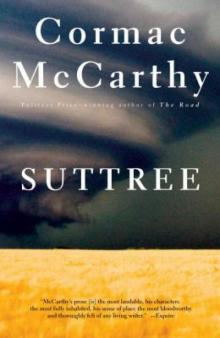 Suttree
Suttree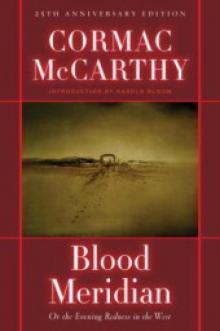 Blood Meridian, or the Evening Redness in the West
Blood Meridian, or the Evening Redness in the West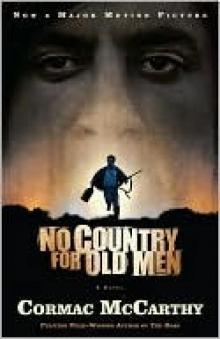 No Country for Old Men
No Country for Old Men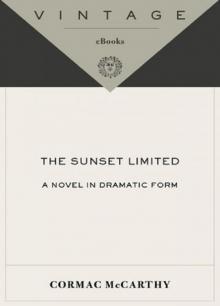 The Sunset Limited
The Sunset Limited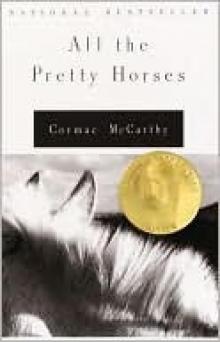 All the Pretty Horses
All the Pretty Horses The Crossing
The Crossing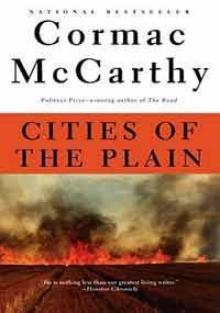 Cities of the Plain
Cities of the Plain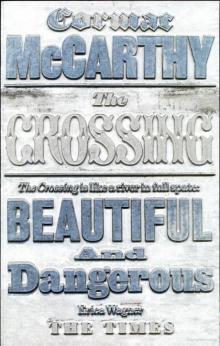 The Crossing tbt-2
The Crossing tbt-2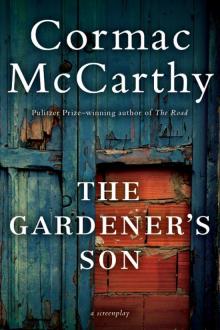 Gardener's Son
Gardener's Son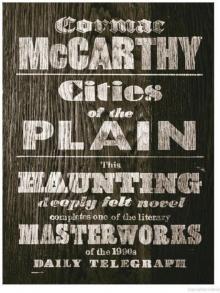 Cities of the Plain tbt-3
Cities of the Plain tbt-3 The Stonemason
The Stonemason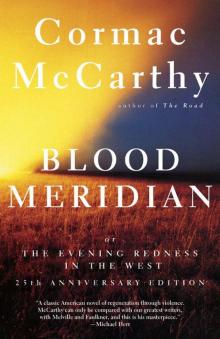 Blood Meridian: Or the Evening Redness in the West (Vintage International)
Blood Meridian: Or the Evening Redness in the West (Vintage International)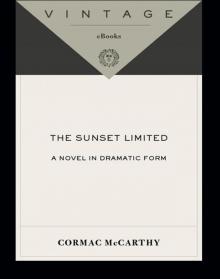 The Sunset Limited: A Novel in Dramatic Form
The Sunset Limited: A Novel in Dramatic Form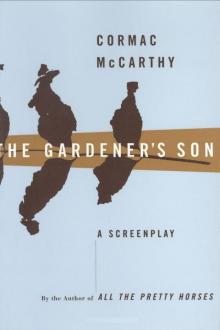 The Gardener's Son
The Gardener's Son